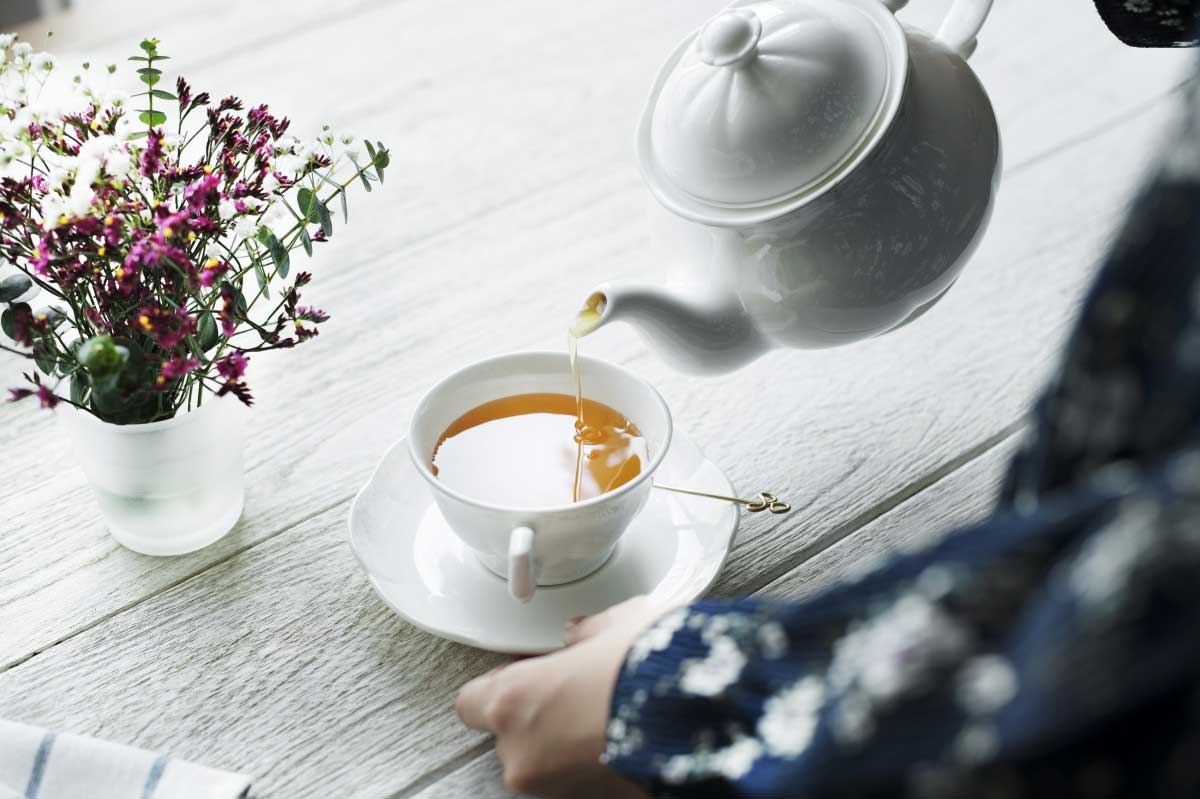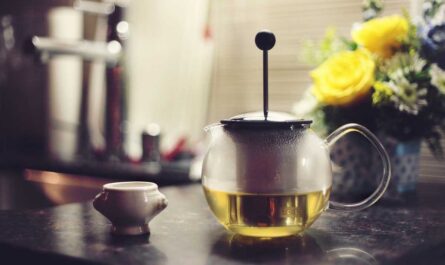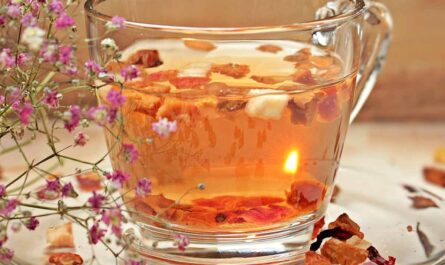What are some of the types of teas to drink for a healthy body & happy mind? When it comes to beverages that offer not only refreshments but also a myriad of health benefits, tea stands as a timeless and versatile choice. The world of tea is a vast and intriguing one, with numerous types and varieties that cater to various tastes and health needs. From the ancient traditions of Asia to the modern wellness movements, tea has consistently held a special place. In this exploration, we delve into a diverse array of teas that promise to nurture both your body and mind, each with its unique flavor profile, aroma, and therapeutic properties.
Types of Teas to Drink for a Healthy Body & Happy Mind
The world of teas offers a diverse and tantalizing array of options for those seeking both physical well-being and a delightful sensory experience. From the antioxidant-rich green tea to the soothing herbal infusions, each type of tea presents a unique opportunity to nurture your body and mind while savoring the complexities of flavor and aroma. So, embark on your tea exploration journey, and let these diverse brews enhance your overall health and wellness.
1. Rooibos: The South African Jewel
Rooibos, the gem of South Africa’s Cederberg region, emerges as a caffeine-free delight, casting a warm, reddish hue that mirrors the richness of its essence. This herbal elixir, a treasure trove of antioxidants and anti-inflammatory properties, beckons as an alternative to traditional teas.
It’s natural sweetness and nutty undertones, reminiscent of honeybush and caramel, conjure a symphony of flavors that envelop the senses. Rooibos, a sanctuary for those seeking solace without the jolt of caffeine, unveils its versatile nature. Beyond its flavorful embrace, it extends its nurturing hand to promote skin health and alleviate allergy symptoms, making it an invaluable addition to the discerning tea enthusiast’s collection.
2. White Tea: A Delicate Elixir of Youth
Within the realm of teas, white tea stands as a pinnacle of refinement, celebrated for its unparalleled delicacy. It resides at the zenith of minimal processing, preserving its natural subtlety. What distinguishes white tea from its counterparts is not just its gentle flavor but also its remarkable health benefits. Laden with polyphenols, this tea variety is hailed for its potential to combat the signs of aging, bestowing upon those who indulge in it the promise of radiant, youthful skin. The taste of white tea, often described as akin to the gentle embrace of fresh flowers or the golden sweetness of honey, unfolds on the palate like an exquisite symphony. Notable among the white teas are the Silver Needle and Bai Mu Dan, each bearing its distinct aroma and unique properties that contribute to overall well-being.
3. Pu-erh Tea: The Aged Elegance
Originating from the lush landscapes of China’s Yunnan province, pu-erh tea is a testament to the artistry of tea-making. It follows a path less traveled, undergoing a distinctive fermentation process that transforms its character with time. Available in both raw and ripe forms, pu-erh carries an air of sophistication that is unmatched. As one indulges in this aged elixir, they embark on a sensory journey through history itself. The flavor profile of pu-erh is an intricate tapestry, weaving together notes of earthiness, subtle hints of wood, the richness of tobacco, and the depth of malt. Beyond its sensory allure, pu-erh is renowned for its potential to nurture digestion, support weight management, and champion the reduction of cholesterol levels. With each sip, one experiences not just the tea but also the wisdom and heritage encapsulated within its leaves.
4. Black Tea: Bold and Invigorating
Black tea, known for its unabashed boldness, reigns as a perennial favorite amongst aficionados of tea across the globe. Its inky hue and intense flavor are the products of an extensive oxidation process, offering a depth that resonates with the senses. Diverse and distinguished varieties such as Assam, Earl Grey, and Darjeeling present a fascinating spectrum of flavors. From the maltiness that envelops your taste buds to the briskness that awakens your senses, or the citrusy notes that dance on your palate to the delicate floral whispers, black tea stands as a testament to the diverse world of flavors. Beyond its captivating taste, black tea boasts an inherent vivacity, owing to its caffeine content, making it a steadfast companion in the pursuit of mental alertness and cardiovascular health. Whether relished plain or with a dash of milk and a sprinkle of sugar, black tea’s timeless charm remains undiminished.
5. Jasmine Tea: Fragrant Elegance
Jasmine tea, a fragrant masterpiece, combines the soothing embrace of green or white tea with the beguiling allure of freshly bloomed jasmine blossoms. This aromatic symphony unfolds as a sensory delight, inviting the weary soul to unwind and find solace. The fragrance of jasmine infuses the tea leaves, creating an elixir of serenity and grace. A sip of jasmine tea transports one to a serene garden, where the petals of jasmine flowers mingle with the gentle whispers of greenery. Beyond its enchanting aroma, jasmine tea offers potential benefits for digestion and guards against certain chronic ailments. Each cup is a fragrant journey, a dance of floral notes that elevates the simple act of tea drinking into a sensory experience akin to strolling through a blossoming garden at dawn.
6. Chamomile Tea May Aid Sleep and Support Immunity
Chamomile tea, a soothing herbal beverage devoid of caffeine, serves as a gentle elixir for those seeking relaxation before bedtime. Its roots trace back to the daisy family, with an illustrious history as one of the world’s oldest documented medicinal plants, replete with multifaceted healing properties. Tea, Coffee, Energy Drinks, Juice, Beverage, Smoothie, and more
Beyond its tranquilizing effects, chamomile tea holds promise for immune health. Although one review suggests that it can stimulate the immune system, further clinical trials are essential to substantiate this claim. Additionally, a comprehensive review in 2022 highlighted potential anti-inflammatory, antioxidant, anticancer, and blood-pressure-lowering attributes of chamomile. However, it’s important to note that most studies contributing to these findings were conducted in laboratory settings rather than on human subjects.
Furthermore, research indicates that chamomile tea may be particularly beneficial for women experiencing premenstrual syndrome, with its recognized anti-inflammatory and anti-anxiety properties. Interestingly, studies have also hinted at a potential link between consuming chamomile tea and decreased mortality risk among Hispanic women over the age of 65.
7. Ginger Tea May Help Treat Nausea and Vomiting
For individuals grappling with stomach discomfort or the queasiness of morning sickness, ginger tea emerges as a soothing remedy renowned for alleviating digestive distress.
Ginger, an ancient root celebrated for its medicinal prowess, is hailed as a safe and effective treatment for nausea and vomiting during pregnancy and chemotherapy, as per a comprehensive review. Research has even suggested that ginger can diminish post-chemotherapy nausea in adults with cancer by a remarkable 40 percent (in the context of supplementation). Beyond its efficacy in this domain, ginger’s active compounds, gingerols, show potential in defending against conditions like diabetes and cancer, as noted in various studies.
Preparing ginger tea is a simple endeavor – grate the root, place the fragments in a cup, pour hot water, and allow it to steep for a few minutes. Alternatively, prepackaged tea bags with dried ginger provide a convenient option for those who prefer a hassle-free approach.
8. Peppermint Tea Is Associated With a Healthy Digestive System
Peppermint tea, akin to ginger, stands as a beacon of digestive well-being. A favored choice to nurture digestion, this herbal infusion boasts a compound called menthol, known to relax the intestinal tract and alleviate bloating, as Al Bochi attests.
Studies conducted in animal models further substantiate peppermint’s digestive benefits, demonstrating its capacity to relax gastrointestinal tissues, a facet emphasized in a comprehensive review. Moreover, peppermint oil emerges as a safe and efficacious short-term remedy for irritable bowel syndrome (IBS), though it’s crucial to discern that peppermint oil is more concentrated than peppermint tea.
Research also extends peppermint’s influence to alleviate chest pain and enhance swallowing in individuals grappling with esophagus disorders. This may be attributed to its potential to relax the smooth muscles residing in the lower esophagus.
Remarkably, peppermint tea is devoid of caffeine, rendering it an optimal choice for a soothing bedtime beverage.

9. Hibiscus Tea May Play a Role in Lowering Blood Pressure
Hibiscus tea, brewed from dried hibiscus leaves, not only tantalizes the taste buds with its tangy allure but may also act as a guardian of cardiovascular health. Recent research suggests that consuming hibiscus tea twice daily can effectively manage blood pressure in individuals with stage one hypertension when coupled with lifestyle and dietary modifications.
Moreover, a 2022 review sheds light on hibiscus’s potential to lower blood pressure, cholesterol levels, blood sugar, and body fat, and alleviate iron deficiency. In the realm of combating obesity, hibiscus exhibits promise as well. A small, randomized trial underscored that participants using hibiscus extract witnessed reductions in body weight, BMI, and central fat mass, irrespective of their physical activity levels.
10. Fennel Tea May Ease Menopause Symptoms
Fennel tea, recognized for its digestive benefits, also assumes the role of a relaxant for digestive muscles, promoting regular bowel movements, according to Al Bochi. Long revered as a medicinal plant, fennel finds extensive use in treating digestive ailments and addressing issues such as IBS. Its antioxidant properties, attributed to polyphenols, feature prominently in a comprehensive review.
Furthermore, fennel may offer relief from menopausal symptoms in postmenopausal women, as per a small study utilizing fennel in capsule form. To partake in the soothing qualities of fennel tea, options abound – procure fennel tea bags or crush fennel seeds, allowing them to steep for a few minutes in a tea ball.
11. Green Tea: The Elixir of Antioxidants
Green tea, a beverage steeped in centuries of Asian tradition, stands as a testament to the bountiful world of antioxidants it offers. Within its delicate leaves lie a treasure trove of potent compounds, including catechins and EGCG, renowned for their formidable capacity to wage war against oxidative stress, reducing the specter of chronic diseases, and nurturing the heart’s well-being.
The taste of green tea, with its distinctive grassy and slightly bitter notes, transcends mere refreshment. It unfolds as a sensory journey, awakening the palate to a symphony of flavors. From the brisk embrace of sencha to the velvety allure of matcha or the aromatic embrace of jasmine green tea, each cup holds a universe of subtle nuances that tantalize both body and mind.
12. Herbal Infusions: Nature’s Bounty in a Cup
Herbal infusions beckon us to partake in nature’s abundant gifts while addressing a spectrum of health needs. Chamomile, with its gentle, floral symphony, serenades the senses and holds the promise of tranquility, ushering in peaceful slumber on its ethereal wings. Peppermint, a lively dance of menthol, lends its vivacious spirit to the cause of digestion, soothing unsettled stomachs with a cool, invigorating embrace.
For those yearning for an elixir to bolster the body’s defenses, echinacea and elderflower infusions stand as sentinels, their rich concoctions brimming with vitamins and antioxidants. These herbal allies serve as a flavorful bastion against the onslaught of illnesses, invoking the healing power of nature in every comforting sip.
13. Oolong Tea: The Artistic Fusion of Green and Black
Oolong tea, often celebrated as “artisanal tea,” emerges as a breathtaking fusion that artfully bridges the gap between the verdant allure of green tea and the profound richness of black tea. Its semi-oxidized leaves weave a tapestry of flavors, a tantalizing spectrum that dances on the palate.
In the world of oolong, diversity reigns supreme. The graceful Tie Guan Yin enchants with its ethereal floral and creamy notes, while Da Hong Pao commands reverence for its earthy, mineral-rich character. Oolong tea invites the tea connoisseur to embark on an intricate tasting journey, mirroring the boundless variety that the tea plant itself bestows upon the discerning palate.
Final thought
In conclusion, it’s worth acknowledging that savoring a diverse array of teas presents a delightful opportunity to harness the myriad benefits offered by these botanical wonders. Drinking tea represents an excellent means of incorporating plant compounds into one’s diet. Even leftover tea need not go to waste; it can be ingeniously utilized to infuse grains like quinoa, brown rice, or couscous with the essence of the tea. Moreover, tea can be employed as a base for marinades, enhancing the flavors of chicken, fish, or tenderloin cuts with its infusion of herbal notes. The realm of culinary possibilities with tea is truly boundless.



